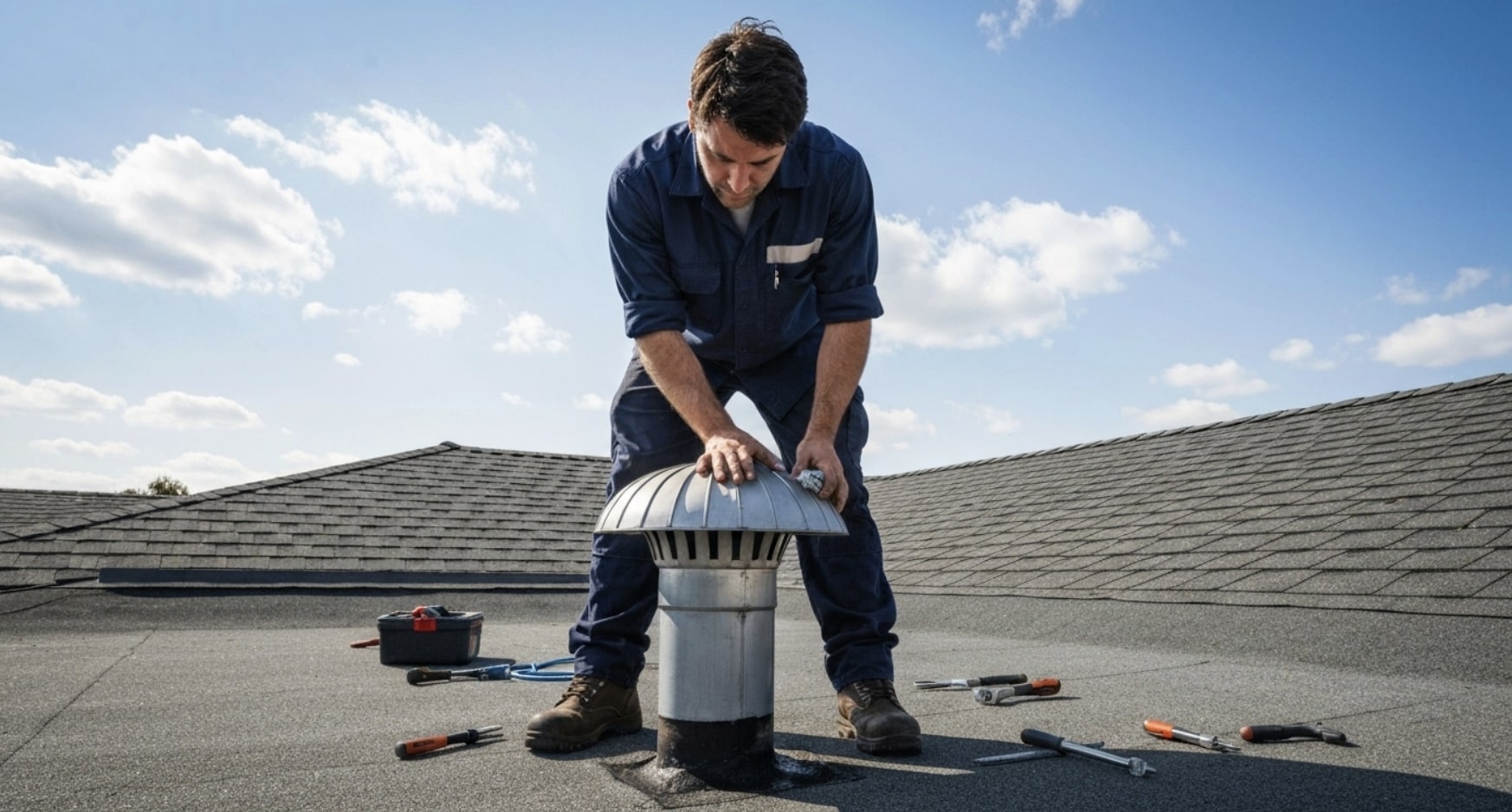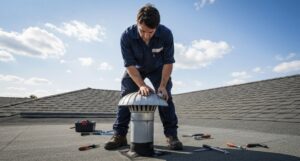Have you ever wondered about those pipes sticking out of your roof? Those are your plumbing vents, and they play a vital role in your home’s plumbing system. While often overlooked, a clean vent pipe is essential for water and waste to flow smoothly away from your home. This guide will explain your question, “How often should I clean plumbing vents?“, as well as what signs to look for, and why this maintenance task is so important for a healthy, odor-free home.
The Importance of Clean Plumbing Vents
Think of your plumbing vent pipe as the lungs of your plumbing system. For your drains to effectively remove wastewater, the system needs to “breathe.” The vent allows air to enter the pipes, equalizing the pressure and helping water flow freely. Without this airflow, negative pressure builds up, creating a vacuum effect that slows drainage to a crawl.
This is why a clogged vent can mimic the symptoms of a drain clog, even when the drain itself is clear. The plumbing vent pipe also serves a critical safety function. It channels foul and potentially hazardous sewer gases up and out through your roof, preventing them from backing up into your living spaces.
A blockage in the vent traps these gases, forcing them to find another escape route—often through your sinks, toilets, and floor drains. This is why a clean plumbing vent is essential for both functionality and air quality in your home.
Key Benefits of Regular Vent Cleaning
Performing regular maintenance on your plumbing vents offers significant advantages that protect your home and your peace of mind. Keeping the vent pipe clear ensures your entire plumbing system operates at peak efficiency, preventing the frustrating and inconvenient issues that arise from blockages.
The key benefits of routine cleaning are clear and impactful. By staying on top of this task, you can avoid more serious and costly repairs down the road. The primary advantages include:
- Improved Drainage: A clean plumbing vent pipe allows water to flow quickly and smoothly through your drains.
- Odor Elimination: It ensures that unpleasant and toxic sewer gases are safely vented outside, not into your home.
- Prevention of Gurgling Noises: Proper airflow eliminates the gurgling sounds from toilets and sinks caused by trapped air.
- Protection of Your Plumbing System: Regular maintenance extends the life of your pipes by preventing pressure imbalances and backups.
Signs Your Plumbing Vent Needs Cleaning
If you suspect a problem with your plumbing, keep an eye out for a few telltale indicators. These signs often point directly to a clogged plumbing vent pipe. You might notice one or several of them appearing around the same time, which is a strong signal that your vent system needs attention.
Don’t dismiss these symptoms as minor annoyances. They are your plumbing system’s way of telling you that it can’t function correctly. The most common red flags to watch for include:
- Strong Sewage Smells: A persistent sewer gas odor in your bathrooms or kitchen is a classic sign that gases can’t escape through the vent pipe.
- Gurgling Sounds: Hearing gurgling or “glugging” noises from your drains or toilet after use indicates that air is trapped in the lines.
- Slow Drains: If multiple drains in your home are draining sluggishly at the same time, a blocked vent is a likely culprit.
- Weak Toilet Flush: A toilet that flushes weakly or refills slowly may not be getting the airflow it needs due to a vent obstruction.
Why Ignoring These Signs Leads to Bigger Problems
Putting off a vent cleaning might seem harmless, but it can lead to significant and expensive consequences. When a plumbing vent is clogged, the initial signs like slow drains and gurgling are just the beginning. As the blockage worsens, the pressure imbalance in your plumbing system intensifies, creating a perfect storm for a major plumbing failure.
The longer you wait, the greater the risk of wastewater backing up into your sinks, showers, and toilets. This isn’t just a mess—it’s a serious health hazard. Sewer water contains harmful bacteria that can contaminate your home and put your family at risk.
Furthermore, the buildup of sewer gas, which contains toxic and combustible methane, poses a significant danger. What starts as a simple clog in a vent can escalate into a full-blown plumbing emergency that requires extensive repairs and cleanup, turning a small problem into a costly disaster.
Recommended Schedule for Cleaning Plumbing Vents
So, how often should you clean your plumbing vents to avoid these issues? While there’s no single answer that fits every home, experts recommend a proactive approach. As a general rule, inspecting and cleaning your plumbing vent pipe every one to two years is a good practice. This routine maintenance helps catch potential clogs before they become serious problems.
However, certain factors can influence how frequently your vents need attention. Understanding these variables will help you create a maintenance schedule that is right for your home.
Expert Guidelines for Single-Family Homes
For most single-family homes, establishing a regular cleaning schedule is the best way to maintain your plumbing system. The age of your home is a key factor in determining this frequency. Older homes with aging plumbing systems may be more susceptible to issues and benefit from more frequent checks.
In addition to full cleanings, it’s a good idea to perform visual inspections of your roof vents seasonally, especially after major storms or in the fall when leaves are abundant. A simple glance can help you spot debris before it creates a blockage.
To make it easier, here are some expert guidelines to follow for your plumbing vent pipe:
| Home’s Age | Recommended Cleaning Frequency |
|---|---|
| Newer Construction (Under 20 years old) | Every 2-3 years |
| Older Construction (Over 20 years old) | Annually |
Factors That May Change Your Cleaning Routine
While the general guidelines are a great starting point, certain environmental and property-specific factors may require you to clean your plumbing vents more often. Your home’s unique surroundings can directly impact how quickly debris accumulates in your vent pipe. If you live in an area with these conditions, you may need to adjust your cleaning schedule to be more frequent.
Being aware of these influences allows you to take a more customized approach to your plumbing maintenance. Consider whether any of the following factors apply to your property:
- Overhanging Trees: Homes with large trees nearby are more prone to clogs from falling leaves, twigs, and bird nests.
- Severe Weather: If you live in an area with heavy snowfall, ice can form inside the vent pipe and create a blockage. Strong storms can also deposit debris.
- Age of the Plumbing System: Older pipes may have corrosion or cracks that can catch debris more easily, necessitating more frequent cleanings.
For Every Home Plumbing Crisis, Target Plumbers Are the Answer
While some minor plumbing maintenance can be a DIY job, cleaning a plumbing vent can be tricky and even dangerous. The work often requires getting on your roof and using specialized tools to clear blockages deep within the plumbing system. For your safety and peace of mind, this is a task best left to trained professionals. Attempting to clear a stubborn clog without the right experience could lead to personal injury or damage to your pipes.
At Target Plumbers, we have the expertise and equipment to handle any plumbing crisis, big or small. Our team can safely and effectively clean your plumbing vent system, diagnosing the root cause of the problem with tools like video cameras. We ensure your plumbing is restored to perfect working order, protecting your home from the hazards of a blocked vent. Don’t risk it—trust the experts to get the job done right.
Conclusion
“How often should I clean plumbing vents?” Maintaining clean plumbing vents is essential for the overall health of your home’s plumbing system. Regular cleaning not only prevents clogs and unpleasant odors but also enhances the efficiency of your plumbing, saving you time and money in the long run. By being aware of the signs that indicate your vents need attention and following a recommended cleaning schedule, you can avoid more significant issues down the line. Remember, a proactive approach to plumbing maintenance ensures your home runs smoothly.
Vents are easy to forget, but they’re part of a balanced system—read Plumbing Maintenance Tips That Every Homeowner Should Know for the complete guide.
Frequently Asked Questions
Can I clean my plumbing vents myself or should I hire a professional?
You can clear minor debris from the vent opening yourself if it’s easily accessible. However, for deep clogs, safety concerns on the roof, or if you notice signs like sewer gas, it’s best to hire a professional. They have the right tools and expertise to safely clean the entire plumbing vent pipe.
What happens if I neglect cleaning my plumbing vents?
Neglecting your plumbing vents leads to slow drains, gurgling noises, and foul sewer odors inside your home. In severe cases, it can cause wastewater to back up into your sinks and toilets, creating a significant mess and health hazard. A blocked vent compromises your entire plumbing system.
Are there specific tools needed for vent pipe cleaning?
For a simple DIY inspection, a flashlight is useful. To clear minor clogs, a plumber’s snake or auger can work. Professionals use more advanced equipment, including high-pressure water jetters and video inspection cameras to locate and remove stubborn blockages deep within the plumbing system without damaging the plumbing vents.






